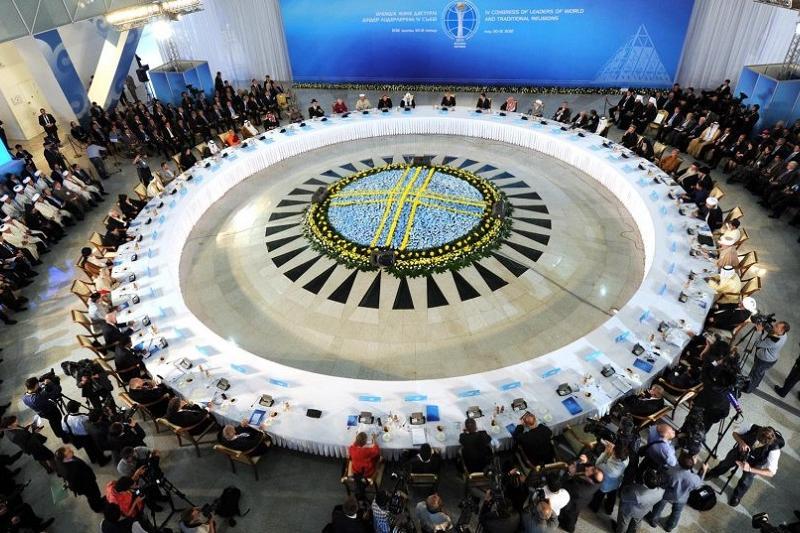ASTANA – World religious leaders gathered to identify global security threats and solutions at a panel session on Oct. 11, the second day of the sixth Congress of Leaders of World and Traditional Religions in Astana. Their recommendations are to be promoted at a research centre and communications platform established by the congress.
The panel session, “Manifesto ‘The World. The 21st Century’ as a concept of global security” was moderated by Secretary General of the Religions for Peace World Conference William Vendley and founder of the Institute Sorbonne-Kazakhstan Marek Halter. It touched on safety as a global task, key political and religious trends, the role of Kazakh President Nursultan Nazarbayev’s manifesto mentioned in the panel’s title in promoting stability, his leadership in nuclear disarmament and nonproliferation and religious leaders’ role in ending war.
Panel speakers included the Dutch Senate deputy Reinder Ruard Ganzevoort, the Commission for the Preservation of America’s Heritage Abroad chairperson Paul Packer, the Association of Buddhists vice chairperson Chun Yi, Pakistani Council of Islamic Ideology chairperson Qibla Ayaz, Worldwide Buddhist network vice president Hirotsugu Terasaki, the Council for Religious and Life Stance Communities executive chairperson Ingrid Rosendor Joys, the Akshardham Center for Applied Research in Social Harmony director Jyotindra Mukundrai Dave, União Planetária president Ulisses Riedel de Resende and the Orthodox Church of Kazakhstan senior cleric Bishop Gennady of Kaskelen.
The sixth congress is being held in a multi-polar world of many geopolitical dimensions. Sanctions, trade wars, volatile financial markets and reduced investment contribute to a less stable economy. Drug trafficking, organised crime and terrorism pose cross-border security threats. Importantly, world politics is increasingly shaped by the use of religion for political purposes and for the justification of terrorism.
Panel speakers began the discussion by noting Kazakhstan’s initiatives in preserving global security.
“Kazakhstan, thanks to the policy of its President since its independence, stands for building a world free from conflict and wars and actively participates in the proliferation of a nuclear-free policy and nuclear weapon disarmament and in organising various events to achieve peace and stability,” said de Resende, commending Nazarbayev’s efforts in building a world without nuclear weapons testing.
The fact that more than 100 different ethnic groups and nationalities live peacefully in Kazakhstan was also not lost on the speakers.
“As leaders, we must never settle for a world in which religion is a dividing force … Kazakhstan’s treatment of the Jewish people is a prime example of ‘aman’ [faith]. For example, during World War II, nearly 200,000 Jews settled in Kazakhstan,” noted Packer.
They further highlighted their concerns on the intersection of global security and religious leadership.
“We urgently need voices of politics and religion, as well as of art, science and everything else. We need visionary stories that things could be otherwise. We need leaders who strongly believe in the possibility to make change… As someone who is active in the world of politics and religion, I am deeply aware of their shortcomings but am also convinced of their potential. I believe it is our task today to avert the dark side and to foster our visionary intentions,” said Ganzervoort, emphasising the importance of combined efforts in politics and religion.
Bishop Gennady singled out younger generations as a key focus area for religious leaders.
“The world is changing rapidly, and man is changing even more rapidly. We see these changes most vividly in the example of young people and their use of informational technology … It is clear that global challenges, via their broadcast on the internet, are acquiring a much larger scale, including the challenge from aggressive pseudo-religious trends that may drastically alter the human personality, especially a young person’s. All of us, in our daily efforts in the coming years, are to fight for the sake of the youth,” he said.
Nazarbayev outlined his vision for the role of technology in spreading the message of peace in his Oct. 10 address to the religious leaders.
“[Through an information portal], each believer may be able to contact the leaders of religious organisations and confessions with a question or a suggestion and receive feedback,” he said.
Likewise, in addition to recognising security threats to society, speakers identified possible solutions.
“I consider it very important to develop a pedagogy of virtues so that existing paradigms may be changed. Ideas rule the world and are often stronger than the sword. To create a better world, it is necessary to strengthen education, which is crucial for maintaining peace,” said de Resende.
A centre will be established as a working body of the congress to promote the recommendations put forward at all six conventions. Research activity in the field of religion, such as inter-civilisational and interreligious dialogue, will also be studied at the centre. This platform for the congress’ continued work and uninterrupted communication was set up at the request of religious leaders, given that the congress convenes once every three years.
The second day of the sixth Congress of Leaders of World and Traditional Religions also included panels on “Religions in a changing geopolitical landscape: new opportunities to unite humanity,” “Religion and globalisation: challenges and responses” and “Religious leaders and politicians overcoming extremism and terrorism.” It also saw the issuance of the congress’ anniversary stamp, a concert, a common prayer, a reception and a closing ceremony.


